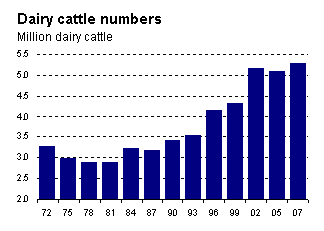User pays would help alleviate water shortages
The recent hot summer has not only been bad for my skin, but for famers as well. A drought has reduced production of agricultural goods, undermining a major source of New Zealand export income. Furthermore, growth in both the number of people and cows has begun to stretch the water infrastructure in some regions, suggesting that a longer-term problem of water shortages beckons. When an economist hears the word shortage there is one thing we think – put the price up. So it is about time we set a price for water, by establishing a market.
One counter-argument for using a price is that there is already a "moral cost" for overusing water. If we create a price for water then people may ignore these moral costs on the basis that they can afford to overuse water, and so may worsen the incidence of water wastage.
In all honesty though, who can say that they are as careful with their water consumption as they would be if they had to pay for it? I get the feeling that a lot of leaky taps would be fixed, long showers avoided, and marginal farm irrigation projects shelved if people had to pay the true cost of the water they use.
The purpose of pricing a good is to ensure its value is clearly represented. Setting an appropriate price would ensure that the allocation of water is efficient, rather than relying on vague moral costs.
In the case of water, however, public opposition to a price is likely to be intense, with the belief that water is a necessity and people should not be charged for it. If we are concerned that the poor will not be able to afford to buy enough water, policymakers could seta price for water and then give everyone sufficient money or vouchers to buy a "necessary" amount of water. Under such a scheme, the price of water beyond this free allocation would be higher relative to other goods in the economy than it is now, and people would buy less – and certainly not all current water consumption is necessary!
However, before a price for water can be established, a market for water is required. A market for water is just a term for the interaction between groups of buyers and sellers of water.
According to René Le Prou, an industrial economist at LECG, there are three distinct ways we could structure the market for water.
- Public provision, where the market price is estimated by the government
- Some form of public-private partnership, where the government is involved in the construction of the infrastructure, but a private company sets the price
- Sell (or hand out) the property rights for water to private groups and allow them to build infrastructure and set prices
Each possibility comes with different costs and benefits that would need to be analysed before any such market could be established. However, all three of these methods have one thing in common — they require a clear definition of "property rights" surrounding water.
Property rights are essential for a pricing system to work. If no one owns the property, no one can stop other people just taking the resource for free. In the case with clearly defined property rights, the owner of the resource has the incentive to "conserve" it. As water is storable (at a cost), there would be an incentive for the owner of the water resource to save water during wet periods to use during dry times — as the value of water rises during a drought. This type of behaviour would help to alleviate the impact of short-term changes in weather, like the sunny days we have experienced recently.
Changes to the market price also provide a timely signal of changes in demand. If the price holds up for a significant amount of time, it provides an incentive for the owner of the water resource to expand supply, by finding other sources of water. In this case, potential infrastructural problems may be overcome.
Water, the elixir of life, is too important to provide on a "first in, first served" basis as we do currently. The establishment of an appropriate market mechanism is the best way to ensure that our scarce water is allocated in the most efficient way possible.
